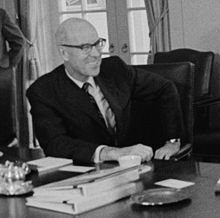Robert S. Ingersoll
| Robert S. Ingersoll | |
|---|---|
 |
|
| United States Deputy Secretary of State | |
|
In office July 10, 1974 – March 31, 1976 |
|
| President |
Richard M. Nixon Gerald Ford |
| Preceded by | Kenneth Rush |
| Succeeded by | Charles W. Robinson |
| Assistant Secretary of State for East Asian and Pacific Affairs | |
|
In office January 8, 1974 – July 9, 1974 |
|
| President | Richard M. Nixon |
| Preceded by | G. McMurtrie Godley |
| Succeeded by | Philip Habib |
| United States Ambassador to Japan | |
|
In office April 12, 1972 – November 8, 1973 |
|
| President | Richard M. Nixon |
| Preceded by | Armin H. Meyer |
| Succeeded by | James D. Hodgson |
| Personal details | |
| Born |
Robert Stephen Ingersoll January 28, 1914 Galesburg, Illinois |
| Died | August 22, 2010 (aged 96) Evanston, Illinois |
| Political party | Republican |
| Spouse(s) | Coralyn Eleanor Reid (m. 1938; her death 2001) |
| Education | |
| Religion | Congregationalist |
Robert Stephen Ingersoll (January 28, 1914 – August 22, 2010) was an American businessman and former diplomat. Ingersoll was Chief executive officer and Chairman of the Board of BorgWarner and his international business experience was an important factor in his selection as United States Ambassador to Japan from 1972 to 1973, and assistant Secretary of State for East Asian and Pacific Affairs from 1973 to 1974, both during President Richard Nixon's term in office. He served as United States Deputy Secretary of State from 1974 to 1976 under both Presidents Nixon and Gerald Ford.
Ingersoll was born on January 28, 1914 in Galesburg, Illinois. he attended the Phillips Academy in Andover, Massachusetts and graduated from the Sheffield Scientific School at Yale University in 1937. After two years with the Armco Steel Corporation, he was hired in 1939 by his father's company, Ingersoll Steel and Disc Company. The company was a subsidiary of Borg-Warner, and he was named in 1942 as works manager of the firm's Kalamazoo, Michigan plant and as head of its Chicago plant in 1945, before being named as division vice president in 1947 and president in 1950 and then as Borg-Warner administrative vice president in 1953. Ingersoll was named in 1956 as the firm's president and chief operating officer, succeeding his father in the post. He was named as that firm's chairman and chief executive in 1961. As CEO, Ingersoll was an active supporter of Urban League programs, supporting "better housing, economic opportunities and voting rights for the colored race" and noting that "[o]ur labor force will be increasingly Negro". By 1972, the firm did business in 22 countries around the world and had global sales of $1.15 billion. Shifting to foreign car companies as U.S. domestic manufacturers bought production in house, by 1971 Ingersoll saw automobile transmission sales increase more than tenfold to 487,000 units in the preceding decade.
...
Wikipedia
